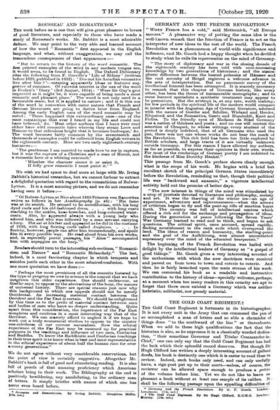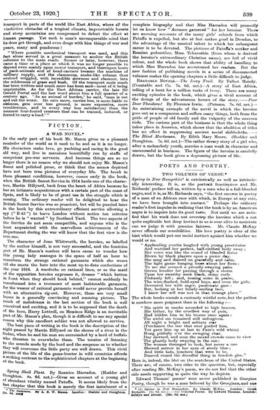THE GOLD COAST REGIMENT4 THE Gold Coast Regiment is fortunate
in its historiographer. It is not every unit is the Army that can command the pen of so accomplished a man of letters and so able a chronicler of things done "to the southward of the line" or thereabouts. When we add to these high qualifications the fact that the historian is also, as he expresses it in a classically worded dedica- tion, " their sometime Governor and Titular Commander-in- Chief," one can only say that the Gold Coast Regiment has had the luck which their splendid record deserves. But though Sir Hugh Clifford has written a deeply interesting account of gallant deeds, his book is distinctly one which it is easier to read than to review. Indeed, such books only need, and can only usefully have, a sign-post put up to their merit—unless, of course, the reviewer can be allowed space enough to produce a Fero of the volume before him. Yet we do not like to leave se pleasant a book without at least one sample of its calibre. It shall be the following passage upon the appalling difficulties of • Germany and Si,. French Revolution. By G. P. Gooch. London Longman. Ells. net.] t Ti,. add coax mows& By Sir Hugh aurced. K.CULG.
Yuaray. pee. Deg
transport in parts of the world like East Africa, where all the vindictive obstacles of a tropical climate, impenetrable forests and steep mountains are compressed to defeat the effort at human passage. Yet such is man's unconquerable mind that lie does got through, and even drags with him things of war and peace, many and ponderous !
" Where possible mechanical transport was used, and this fact alone served in a great measure to anchor the British columns to the main roads. Sooner or later, however, there came a time or a place at which it was no longer possible to depend even mainly upon motor transport, and thereupon hosts of paokanimals and of head-carriers became the machine of military supply, and the clamorous, snake-like column thus evolved wriggled, with incredible slowness and clamour, into the wilderness of grass and bush. Of the transport mule much has been written and much more has been said—most of it being unprintable. As for the East African carrier, the lath Sir Gerald Portal said the last word about him a full quarter of a century ago. As an animal of burden,' he said, 'man is out and out the worst. He eats more, carries less, is more liable to sickness, gets over less ground, is more expensive, more troublesome, and in every way less satisfactory than the meanest four-footed creature that can be trained, induced, or forced to carry a load.' "



































 Previous page
Previous page